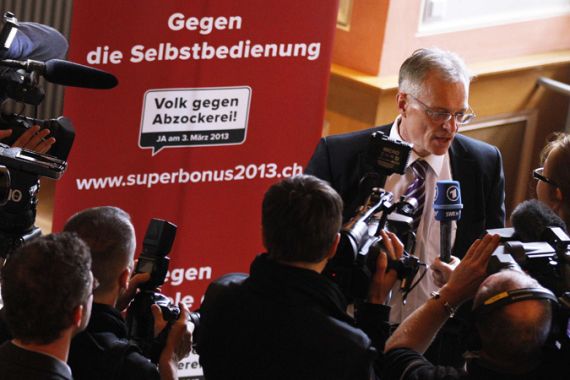Swiss vote for tough curbs on executive pay
Voters approve some of world’s strictest controls on executive pay, including ban on big bonuses for departing managers.

Swiss citizens voted to impose some of the world’s strictest controls on executive pay, forcing public companies to give shareholders a binding vote on compensation, initial result projections showed.
Claude Longchamp, of pollsters Gfs Bern, told Swiss state television on Sunday early returns in a referendum showed 68 percent backed plans for shareholders to veto executive pay and for a ban on big rewards for new and departing managers.
Keep reading
list of 4 itemsEcuador weighs security, international arbitration in latest referendum
‘Triple spending’: Zimbabweans bear cost of changing to new ZiG currency
Boeing hit with 32 whistleblower claims, as dead worker’s case reviewed
The clear majority was unusual given fierce opposition and intense campaigning by a business lobby group, which warned the proposals will damage the country’s competitiveness and scare away international talent.
Support for the move was fired by anger over the big bonuses blamed for fuelling risky investments that nearly felled Swiss bank UBS, as well as outrage over a proposed $78m payment to outgoing Novartis chairman Daniel Vasella.
Longchamp said the public outcry last month that forced Novartis to cancel Vasella’s “golden goodbye” helped drive the campaign.
“It emotionalised and it mobilised,” he said.
‘Short-termism’ culture
Thomas Minder, the businessman-turned-politician behind the campaign, says his proposals are aimed at ending a culture of short-termism and rewards for managers of badly-run companies rather than just capping salaries.
Despite threats from some executives, Switzerland is unlikely to see an exodus of big companies, drawn to the country by low taxes, stable politics and business-friendly laws.
And companies will seek ways around the new rules to reward executives, just as banks in Europe are looking to soften the impact of a cap on bonuses for top staff agreed by European politicians on Thursday.
“If a company wants to pay a top executive 25 million, then they will find a way to do so regardless of the initiative,” Rolf Soiron, chairman of cement maker Holcim and drugs industry supplier Lonza, told the Reuters news agency before the vote.
Experts also question whether shareholders in Swiss companies will make full use of their new rights.
Of the top 100 Swiss companies, 49 already give shareholders a non-binding vote on the pay of executives. But while opposition to pay deals is on the rise, a majority of investors have never voted them down.
Possible jail
Swiss companies accounted for five of the top 10 best-paid chairmen in Europe in 2011, but only the heads of Novartis and Roche made it into the continent’s top 10 for chief executives.
While anger at multi-million dollar payouts for executives has spread around the globe since the financial crisis, the Swiss system of direct democracy means populist proposals have a greater chance of implementation.
Minder’s initiative forces binding votes on compensation every year as well as on board composition and would also ban bonus payments to managers if their companies are taken over.
The plan also includes possible jail sentences and fines for breaching the new rules.
While Switzerland has fared relatively well through the financial crisis, the near collapse of flagship bank UBS in 2008 stoked anger among Swiss who blamed its heavy losses on rewarding bankers to make risky bets.
Last year, more than one-third of UBS shareholders rejected the bank’s plans for executive pay, including a $4.2m signing-on fee for new German chairman Axel Weber, after a sub-par 2011 profit and a $2bn rogue trading scandal.